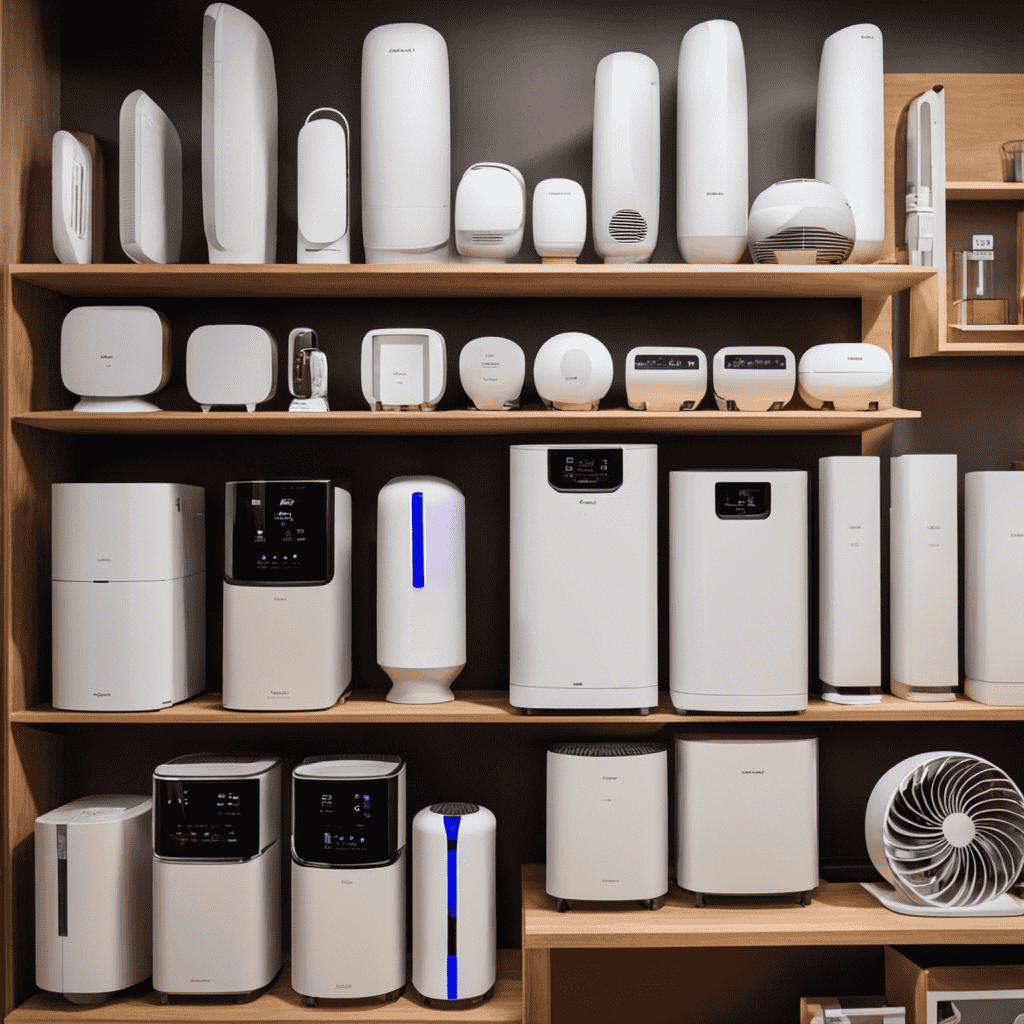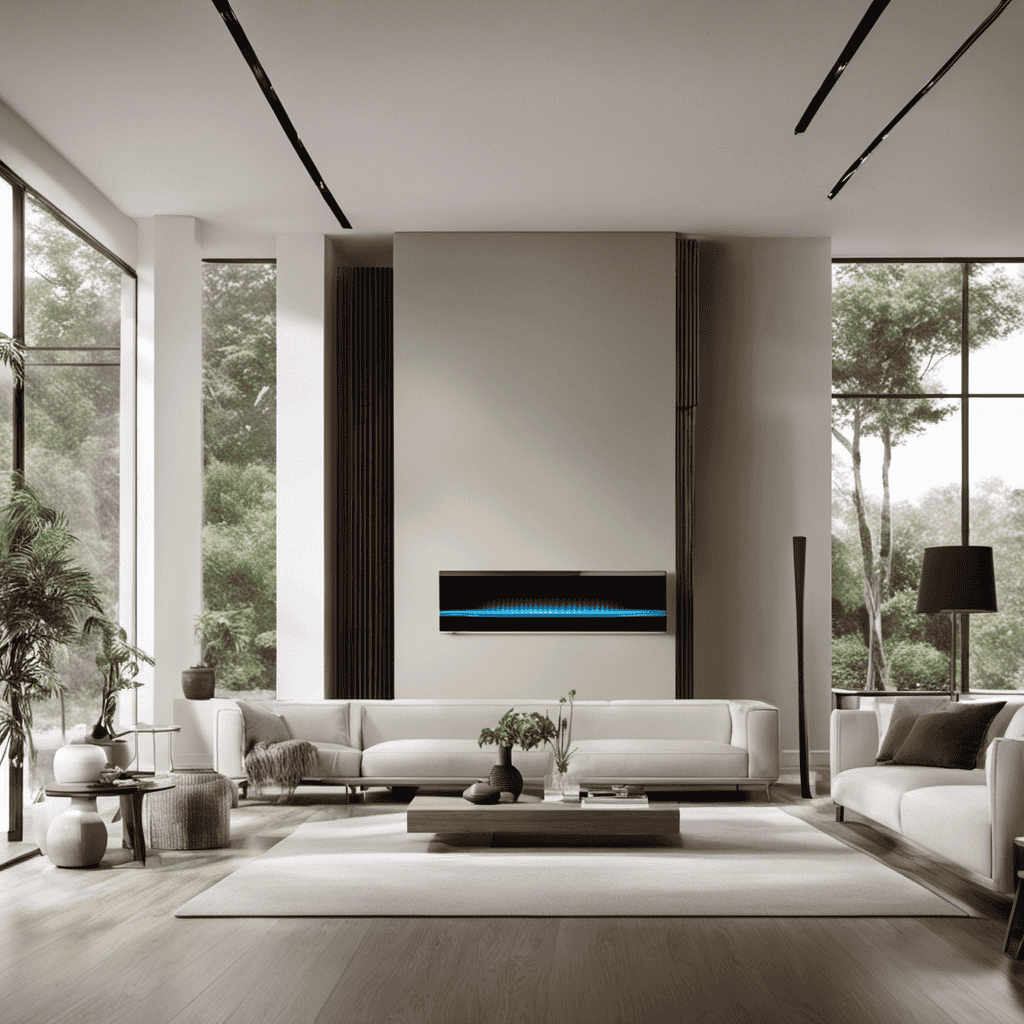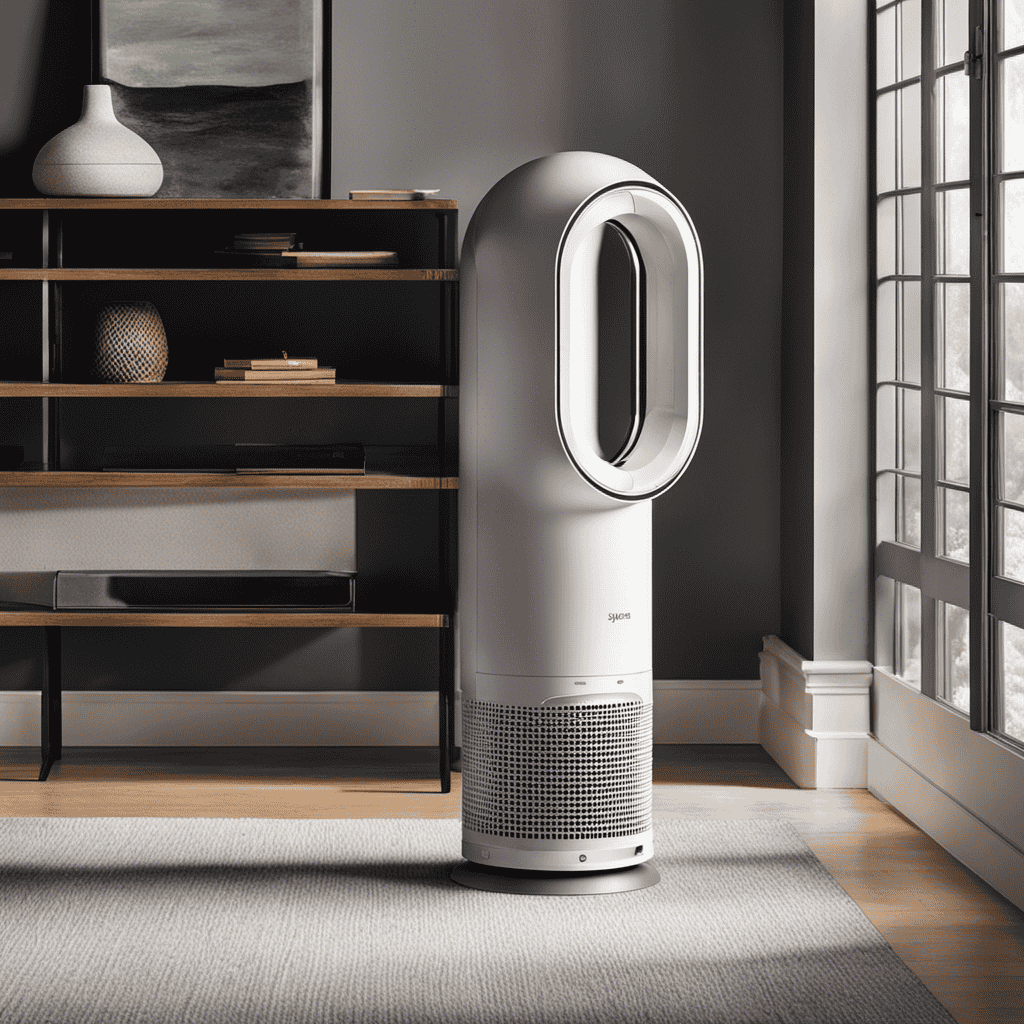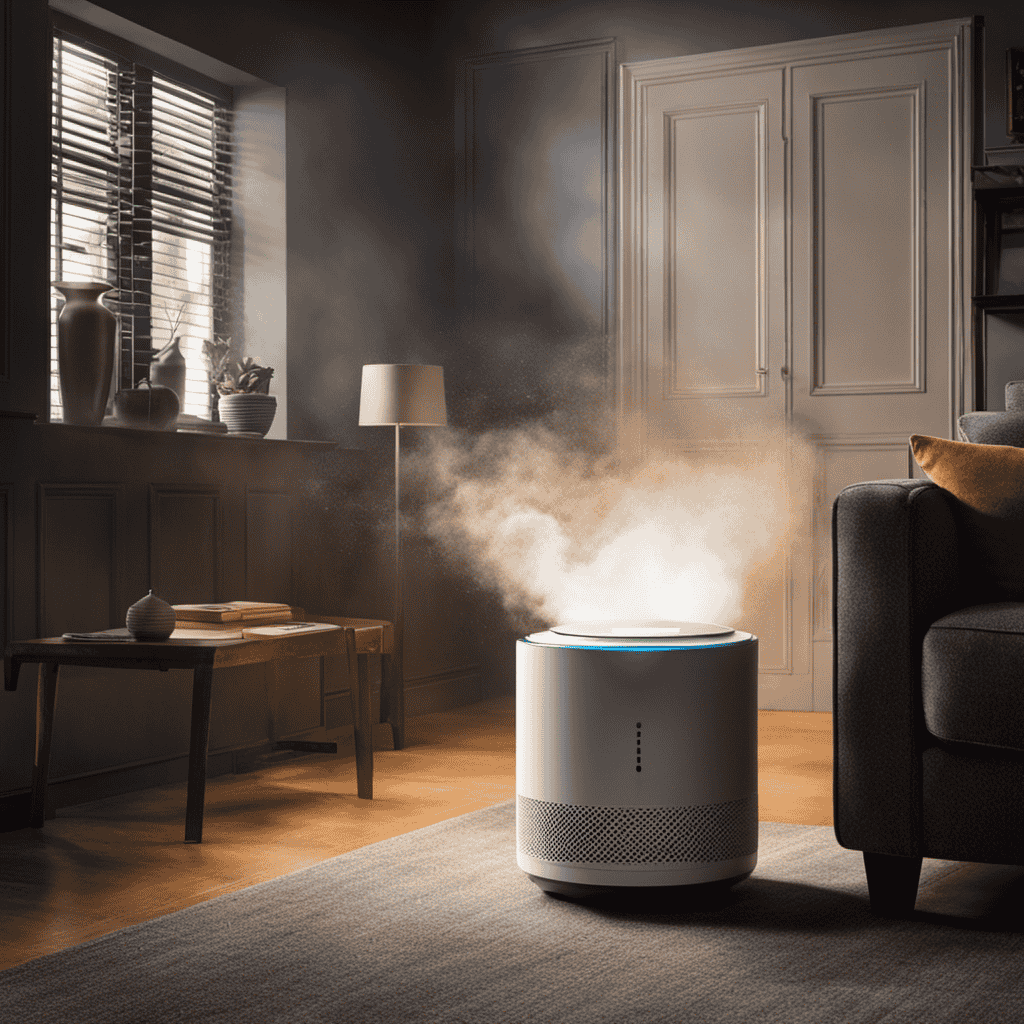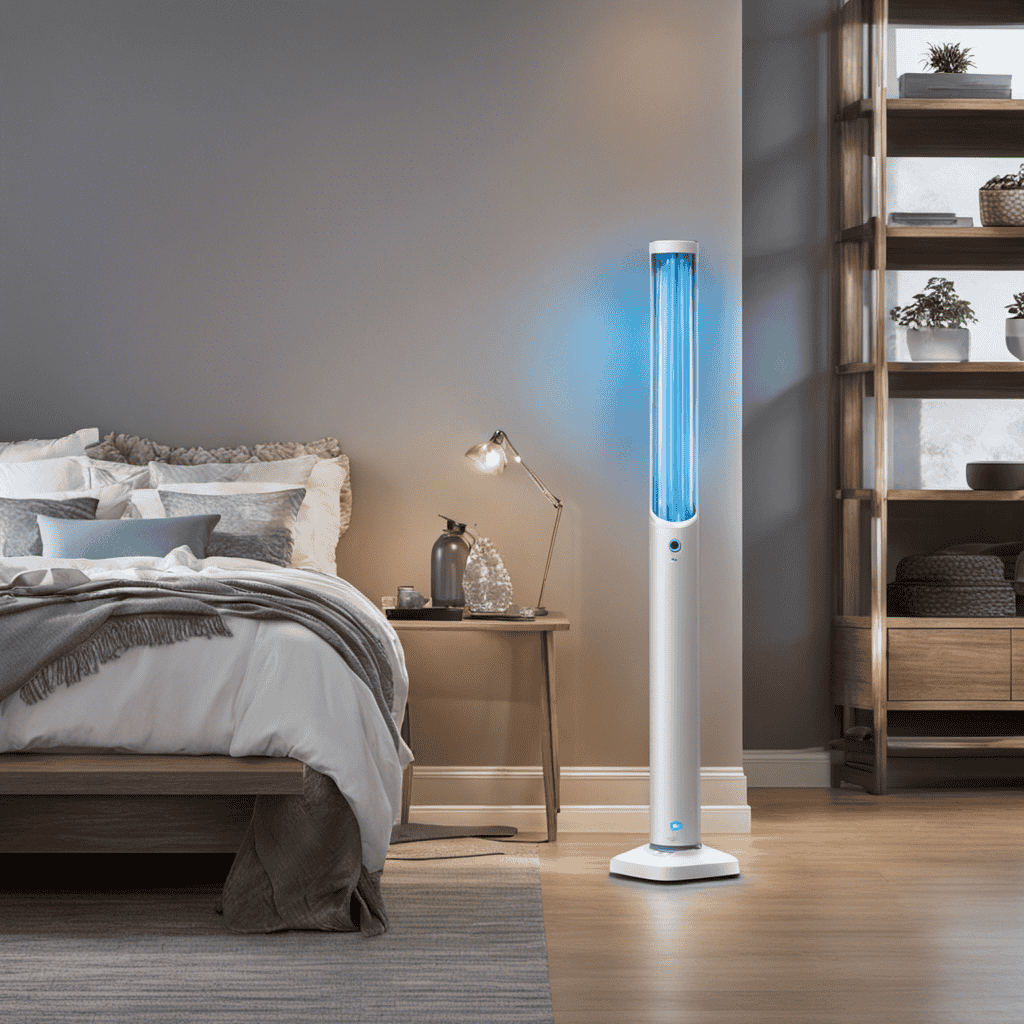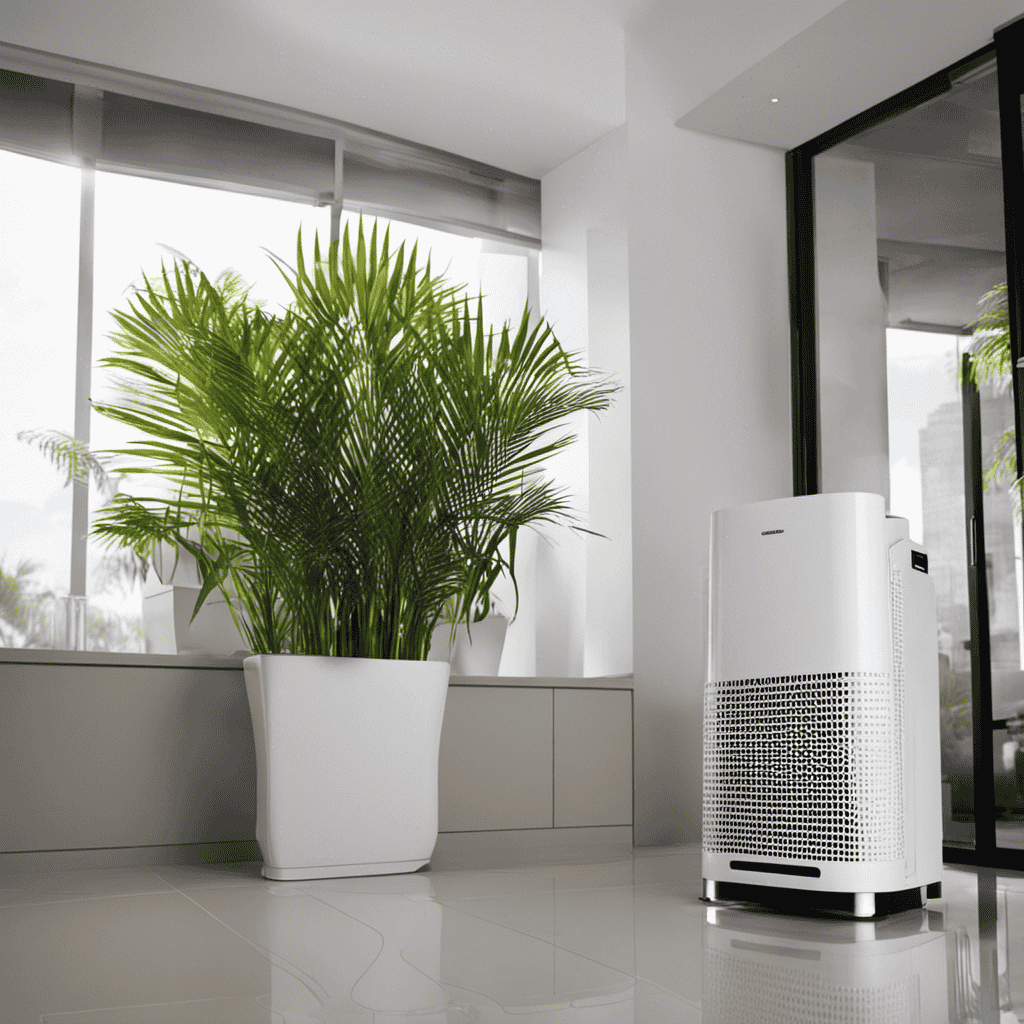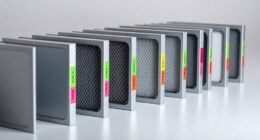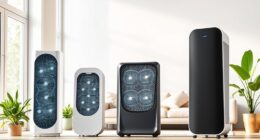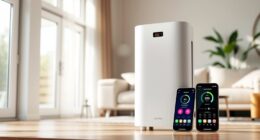As someone passionate about air quality, I’ve continuously pondered why there’s such a wide range in the pricing of air purifiers. It seems like navigating through a maze of choices, each marked with its own price point.
But fear not, fellow seekers of clean air! In this article, we will delve into the factors that influence air purifier prices. From cutting-edge technology to brand influence, we will unravel the mysteries behind these variations.
So, join me on this journey as we uncover the secrets behind the varying prices of air purifiers.
Key Takeaways
- Factors such as filtration technology advancements, energy efficiency, brand reputation, features and technology, and size and coverage area considerations contribute to the variation in air purifier prices.
- The inclusion of advanced filtration systems, smart sensor technology, high-end features, enhanced performance, and added convenience can increase the cost of air purifiers.
- An advanced filtration system is crucial for effective air purification, as it captures a wide range of pollutants, traps smaller particles, and ensures better air quality and reduced health risks.
- Smart sensor technology, which automatically detects changes in air quality, monitors humidity levels, temperature, and VOCs, provides real-time data, and allows remote monitoring and control, can also impact the price of air purifiers.
Factors Affecting Air Purifier Prices
When it comes to air purifier prices, there are several factors that can affect how much you’ll pay.
One of these factors is the filtration technology advancements. As technology continues to advance, air purifiers are becoming more efficient at removing pollutants and allergens from the air. This means that newer models with advanced filtration systems may come with a higher price tag.
Another factor to consider is the energy efficiency of the air purifier. Energy-efficient models are designed to consume less power while still providing effective air purification. These models may be priced higher initially, but they can save you money in the long run by reducing energy costs.
Technology and Features Impacting Air Purifier Costs
When it comes to air purifiers, two key features that significantly impact the cost are the advanced filtration system and smart sensor technology.
An advanced filtration system is crucial for effectively removing pollutants and allergens from the air, making it a desirable feature in high-end air purifiers.
Smart sensor technology, on the other hand, allows the device to automatically detect and adjust its settings based on the air quality, providing a more efficient and convenient user experience.
As a result, air purifiers equipped with these advanced features tend to be more expensive due to their enhanced performance and added convenience.
Advanced Filtration System
The advanced filtration system in air purifiers is one reason why their prices can vary. When it comes to air purification, the quality of the filtration system plays a crucial role in determining the effectiveness of the device. Higher-priced models often feature advanced filters that can effectively capture and remove a wide range of pollutants, including dust, pollen, pet dander, and even harmful gases. These advanced filters are designed to provide superior air quality by trapping smaller particles that standard filters might miss. Additionally, these filters are often designed to be energy efficient, consuming less power while still delivering optimal performance. While the advanced filtration system in air purifiers contributes to their higher price, it also ensures better air quality and reduced health risks for users.
Now, let’s delve into another important feature that impacts the pricing of air purifiers: smart sensor technology.
Smart Sensor Technology
Smart sensor technology enhances the functionality of air purifiers. It automatically detects and responds to changes in air quality. These sensors play a crucial role in maintaining a healthy indoor environment. They continuously monitor the air and provide real-time data on its quality.
With advancements in technology, air purifiers now come equipped with smart sensors. These sensors not only detect particles and pollutants but also monitor humidity levels, temperature, and even volatile organic compounds (VOCs). This integration of smart home technology allows for greater control and convenience.
Users can monitor and adjust their air purifiers remotely using their smartphones or other smart devices. By providing accurate and up-to-date information on air quality, smart sensor technology ensures that air purifiers operate at optimal levels. This effectively removes contaminants and improves overall indoor air quality.
Brand Influence on Air Purifier Pricing
When it comes to air purifiers, brand reputation plays a significant role in pricing. Established brands that have a strong reputation for manufacturing high-quality air purifiers often charge a premium for their products. This is because consumers are willing to pay more for a brand they trust and believe will deliver superior performance.
Additionally, there is a correlation between the features offered by an air purifier and its price. Models with advanced features such as multiple filtration layers, smart technology, and automatic sensors tend to be priced higher than basic models with fewer features.
Brand Reputation and Pricing
You’ll notice that brand reputation plays a significant role in determining the price of air purifiers. As consumers, we tend to associate certain brands with quality, reliability, and innovation. This perception is carefully cultivated by companies through their marketing strategies.
Here are three ways brand reputation influences air purifier pricing:
-
Consumer Perception: Brands that have established themselves as leaders in the air purifier industry are able to command higher prices due to the trust and confidence consumers have in their products.
-
Marketing Strategies: Brands with strong reputations invest heavily in marketing to create a positive image and build brand loyalty. These marketing efforts contribute to higher costs, which are reflected in the price of their air purifiers.
-
Research and Development: Well-known brands often invest significant resources into research and development to stay ahead of the competition. This commitment to innovation results in higher manufacturing costs, which are passed on to consumers.
These factors highlight the importance of brand reputation in the pricing of air purifiers. However, it is not the only determining factor. Other aspects such as features and performance also play a crucial role in price differentiation.
Features and Price Correlation
If you’re looking for an air purifier with advanced features, it’s important to consider the correlation between these features and the overall cost.
The design of an air purifier can greatly affect its performance and efficiency. Different air purifiers have different designs, such as HEPA filters, activated carbon filters, or ionizers, which target specific pollutants in the air.
These advanced features come at a higher price, but they also offer better air purification results.
Additionally, customer reviews play a crucial role in determining the effectiveness of an air purifier. By reading customer reviews, you can get insights into the performance, durability, and overall satisfaction of a particular model.
Considering the correlation between features and cost, along with customer reviews, will help you make an informed decision when purchasing an air purifier.
Size and Coverage Area Considerations for Air Purifier Price Differences
Take into account the size of the room and the coverage area needed when considering the price differences of air purifiers. The size and performance of an air purifier directly impact its price.
When choosing an air purifier, consider the size of the room it will be placed in. A smaller room will require a smaller air purifier, while a larger room will need a larger one.
The coverage area of an air purifier, which refers to the square footage it can effectively clean, is another important factor to consider. A higher coverage area typically comes with a higher price tag.
Additionally, energy efficiency and cost go hand in hand. Energy-efficient air purifiers may have a higher upfront cost but can save you money in the long run by reducing energy consumption.
Don’t forget to factor in ongoing maintenance costs, such as filter replacements, when comparing air purifier prices.
The Role of Filters in Determining Air Purifier Prices
In addition to size and coverage area considerations, another factor that significantly influences the price of air purifiers is the type and quality of filters used.
Filters play a crucial role in the effectiveness of air purifiers by capturing and removing various pollutants from the air. Different filters target specific contaminants such as dust, pollen, pet dander, and smoke particles.
The cost of filters can vary depending on their material, size, and lifespan. High-quality filters with advanced filtration technologies tend to be more expensive but offer better air purification performance.
It is important to consider the maintenance costs associated with filters, as they need to be replaced regularly to ensure optimal air quality. Additionally, choosing air purifiers with energy-efficient filters can reduce long-term operational costs and contribute to environmental sustainability.
Proper filter maintenance and regular replacement are essential for maintaining the efficiency and effectiveness of air purifiers in the long run.
How Additional Functions and Smart Features Affect Air Purifier Costs
When considering air purifiers, you’ll find that additional functions and smart features can significantly impact the cost. As technology advances, air purifiers are becoming more than just devices that filter out pollutants. They now come with a range of features that enhance their performance and convenience.
Here are some additional functions and smart features that can affect the cost of air purifiers:
-
Air quality sensors: These sensors detect the level of pollutants in the air and adjust the purifier’s settings accordingly. This ensures optimal purification and can improve air quality impact.
-
Wi-Fi connectivity: With Wi-Fi connectivity, you can control your air purifier remotely through a smartphone app. This feature adds convenience and allows you to monitor and control the device from anywhere.
-
Smart home integration: Some air purifiers can be integrated with smart home systems like Amazon Alexa or Google Assistant, allowing you to control them using voice commands.
In addition to these features, it’s important to consider the energy efficiency of an air purifier. Look for models with an Energy Star certification, as they are designed to consume less electricity and save you money in the long run.
Frequently Asked Questions
Are Air Purifiers Only Effective for People With Allergies or Respiratory Issues?
Air purifiers are not only effective for people with allergies or respiratory issues. They can also provide benefits for non-allergic individuals, such as reducing exposure to indoor pollutants and improving overall air quality for long term health.
Can Air Purifiers Remove All Types of Indoor Pollutants, Such as Odors and Volatile Organic Compounds (Vocs)?
Yes, air purifiers can remove various indoor pollutants, including odors and volatile organic compounds (VOCs). Different types of air purifiers use filters, activated carbon, or UV light to capture and neutralize these contaminants, improving indoor air quality.
Do All Air Purifiers Require Regular Filter Replacements, and How Often Do They Need to Be Replaced?
Regular filter replacements are necessary for air purifiers to maintain optimal performance and ensure the importance of clean air. The frequency of replacement varies depending on the model and usage, but it is crucial for effective purification.
Are There Any Health Risks Associated With Using Air Purifiers, Such as Ozone Emissions?
There are potential health risks associated with using air purifiers, such as ozone emissions. However, it’s important to note that not all air purifiers produce ozone, and choosing one with low ozone emissions can mitigate these risks.
Can Air Purifiers Be Used in Larger Spaces, Such as Offices or Commercial Buildings, and How Does It Affect Their Pricing?
Air purifiers for home use are priced differently based on factors like brand, features, and filtration technology. In offices and commercial buildings, larger spaces require more powerful purifiers, which can increase the price.
Conclusion
In conclusion, after extensive research and analysis, it becomes clear that the price variation of air purifiers is influenced by several factors.
The technology and features incorporated into the purifier play a significant role in determining its cost. Additionally, the brand of the purifier can greatly impact its price, with well-known and reputable brands often commanding higher prices.
Size and coverage area considerations also contribute to price differences, as larger purifiers designed for larger spaces tend to be more expensive. Lastly, the type and quality of filters used in the purifier can significantly affect its price. Furthermore, the inclusion of additional functions and smart features can further increase the cost.
Overall, understanding these factors is crucial in making an informed decision when purchasing an air purifier. The suspenseful journey of discovering the reasons behind the price variation of air purifiers leaves a vivid image in the reader’s mind, highlighting the complex and multifaceted nature of this market.
